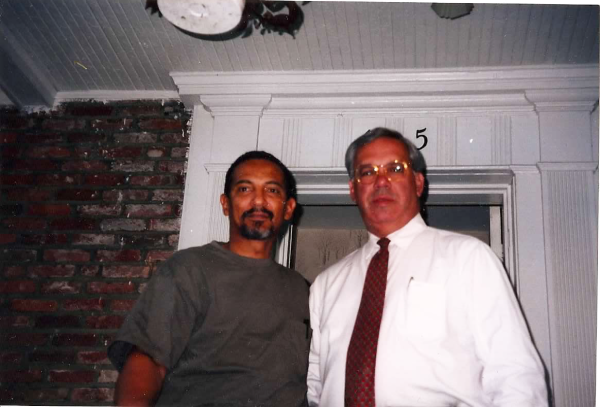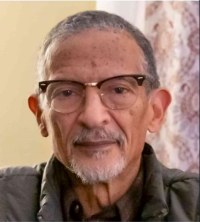January 10, 2024

Muhammad Ali-Salaam is shown with Mayor Tom Menino in a photo circa 1995. Menino counted Ali-Salaam among his key allies. Darryl Smith photo

For decades, if there was a problem that seemingly couldn’t be fixed, Mattapan’s Muhammad Ali-Salaam was the person that the city sent in to take a look, and solutions usually followed in short order.
Mr. Ali-Salaam, who passed away on Jan. 4 at 78, moved to the city in the early 1970s with a young family and over time became a trusted employee at the Boston Redevelopment Authority (BRA) – the agency now known as the BPDA.
“My dad, he loved Boston and all of the people in it,” said his daughter, Fatima Ali-Salaam, the oldest of the eight children born to Muhammad and his wife of 58 years, Waheeda. “He was a nice and gentle person and never put himself in the spotlight, which is the way he wanted it…He wasn’t crass or cruel and he didn’t do things loudly…He wrote the book on engagement – broke the mold. You knew he cared.”
Born in the Republic of Panama, Mr. Ali-Salaam immigrated to New York City with his parents as a child in the 1950s. They moved to Washington, D.C., when he was a teen-ager, and he met Waheeda and got married there. Then came the move to Boston in the 1970s, where he later accepted a job at the BRA, which was then led by the late Steve Coyle. He and his family settled in Mattapan, where they have lived for almost 50 years.
Fatima said they were a family that read the newspapers daily, and talked at home about art, architecture, culture and, especially, civics.
“My mother and father always made sure we were involved,” she said. “You weren’t just book smart, but you were to actually understand what you were reading, your surroundings, and the people around you. He didn’t think you should just live somewhere, but you should be involved.”
Darryl Smith, of Dorchester, said that Mr. Ali-Salaam was his professor and mentor at Roxbury Community College some 40 years ago. Smith followed his mentor to City Hall, where even today Mr. Ali-Salaam is highly regarded, though he left his city job in 2011 to work as a liaison for the US Dept. of Justice and the FBI.
“I dub him the ‘encyclopedia’ of the BRA,” said Smith, noting that Mr. Ali-Salaam significantly revised zoning for Roxbury, Jamaica Plain and other neighborhoods. “When we had issues…Muhammad was the go-to guy to be able to take a problem and solve a problem – to get something that was stuck at point ‘A’ to move to point ‘B.’ He was a great man of principle – quiet and consistent.”
Noted Congresswoman Ayanna Pressley, “Muhammad Ali-Salaam’s transition is not just a loss for the city of Boston, not just Roxbury, not just the Muslim community, but for humanity. His influence and legacy had an outsized impact beyond his leadership roles with the Boston Redevelopment Authority, the Islamic Society of Boston Cultural Center, and the Museum of African American History. He was a man very much guided by his faith and actualized it as a pillar of our communities. Muhammad was a strategist and an architect who informed, educated, and mobilized the community. So many of us are beneficiaries of the ground he laid, and he will be thoroughly missed.”
Current BPDA director Arthur Jemison recalled that Mr. Ali-Salaam was a “true leader and one of only a few people of color serving there at the BRA when Jemison worked there during his previous stint at the agency.
“He was committed to giving community members a voice in planning and zoning in their neighborhoods,” said Jemison. “He had a broad impact across the city, and he was instrumental in getting people in Roxbury and Mattapan better access to city services through planning, in the 1980s and 1990s. He will be sorely missed in the Boston community.”
The attorney Joe Feaster worked with Mr. Ali-Salaam in his City Hall capacity and more recently as a member the Communities of Color organization, which was co-founded by Daryl Smith.
“Muhammad the man was a quiet and gentle force and one thing I would say about him is that he was a statesman,” said Feaster. “He was able to find middle ground and consensus where there were competing interests. There was a particular twinkle in his eyes that made it so you couldn’t tell him ‘no.’”
Mr. Ali-Salaam was a driving force behind the Museum of African American History in Roxbury and a founder of the Islamic Society of Boston Cultural Center (ISBCC) at Roxbury Crossing – the largest mosque in New England. These were pursuits that were difficult, and even brought about death threats, friends recall.
“After God, he was the one most responsible for building that mosque,” said Yusufi Vali, former executive director of the ISBCC. “He worked for the city at a time when Roxbury, Dorchester and Mattapan and people of color were not connected,” Vali added. “He and a group of people he mentored became that deep connection to the neighborhoods. If people there needed services, they became the de facto neighborhood liaisons.”
Vali also said that he was a great “bridge” within the Muslim community to bring together African American Muslims and immigrant Muslims, who, though relationships were challenging, and experiences different, found commonality through Mr. Ali-Salaam in the building of the ISBCC.
Feaster said that while he was well regarded in all corners of the city, “something in Mattapan should be named after Muhammad Ali-Salaam,” he said. “That is certain.”
A funeral service has been held at the Gardens Cemetery in West Roxbury. In lieu of flowers, donations are welcomed at the Museum of African American History (maah.org).
Villages:



